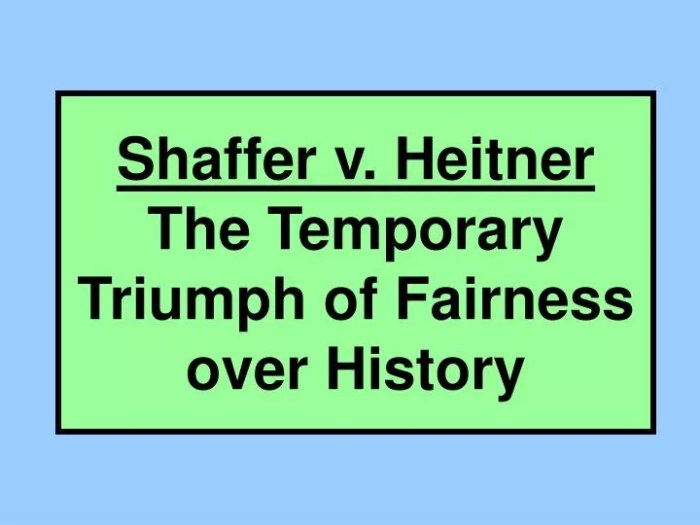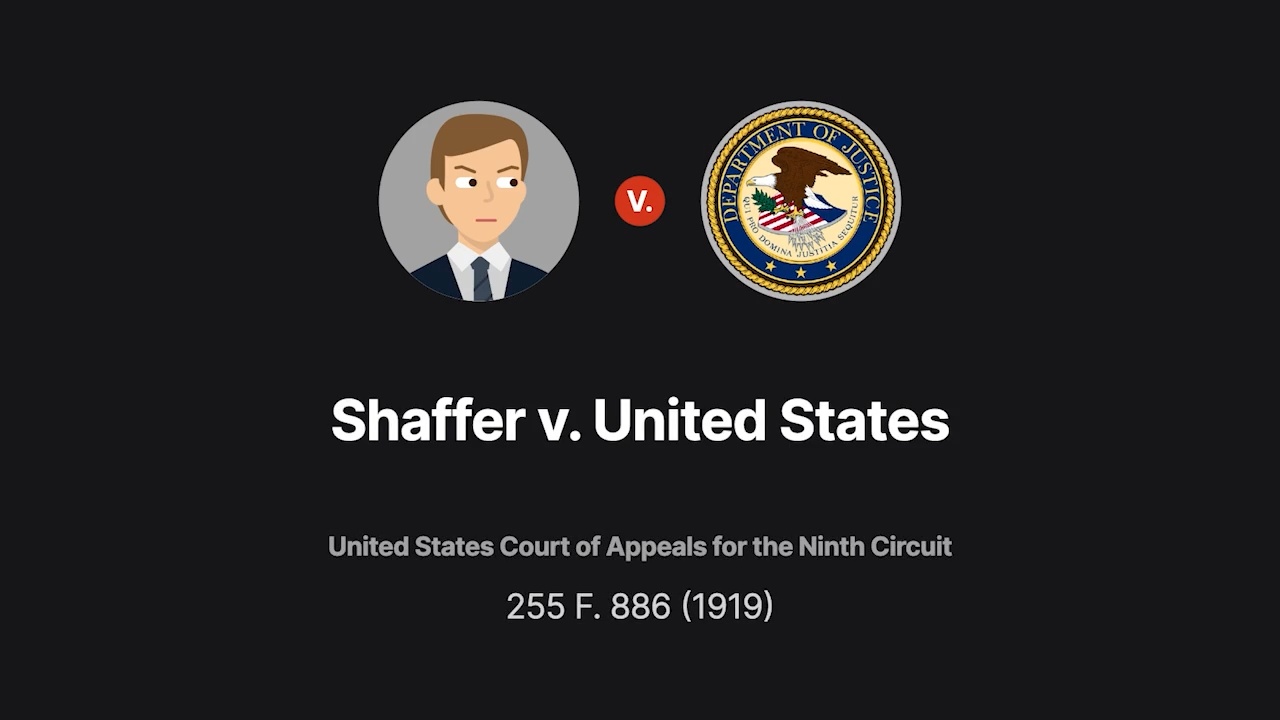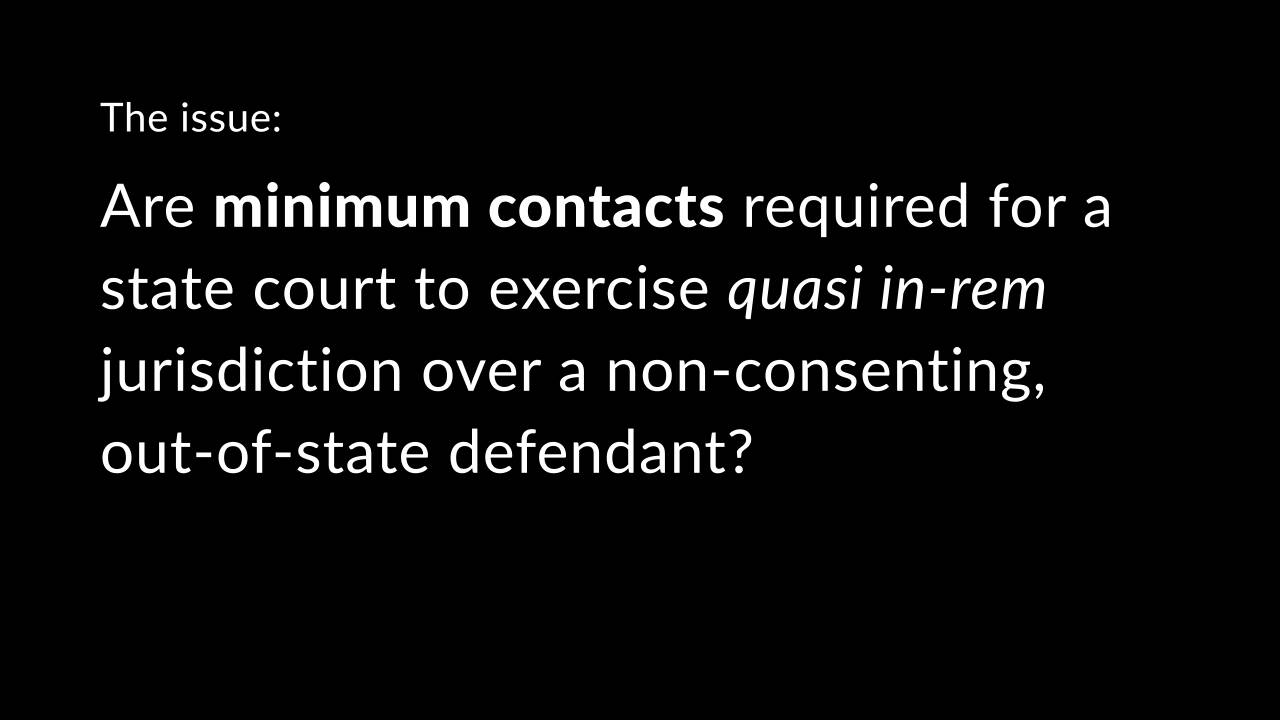Shaffer v heitner case brief – The Shaffer v. Heitner case brief delves into the intricacies of personal jurisdiction, a fundamental concept in civil procedure. This landmark ruling established a framework for determining when a court can exercise jurisdiction over a defendant who is not physically present within its territory.
The case involved a dispute between two non-residents of Delaware. The plaintiff, Shaffer, sought to recover a debt from the defendant, Heitner. Heitner challenged the Delaware court’s jurisdiction, arguing that he had no meaningful contacts with the state.
Case Overview
Legal Issue(s)
The central legal issue in Shaffer v. Heitner revolves around the question of whether a court can exercise personal jurisdiction over a non-resident defendant who lacks sufficient contacts with the forum state.
Facts and Procedural History
The case arose from a dispute between Shaffer, a Delaware resident, and Heitner, a non-resident of Delaware. Shaffer sued Heitner in Delaware, alleging that Heitner had defrauded him in a stock transaction. Heitner contested the court’s personal jurisdiction over him, arguing that he did not have sufficient contacts with Delaware.
Lower Court Proceedings
The lower court proceedings in Shaffer v. Heitnerwere marked by several key arguments made by both parties and a pivotal decision that shaped the outcome of the case.
Arguments Made by the Parties
The plaintiff, Shaffer, argued that the Delaware court lacked personal jurisdiction over Heitner because he was not a resident of Delaware and had not been properly served with process. Heitner, on the other hand, contended that he had sufficient contacts with Delaware to establish personal jurisdiction and that he had been properly served.
Lower Court’s Decision and Rationale
The lower court ruled in favor of Shaffer, holding that Delaware lacked personal jurisdiction over Heitner. The court found that Heitner’s contacts with Delaware were not substantial enough to justify exercising personal jurisdiction and that he had not been properly served with process.
This decision set the stage for the subsequent appeal to the Supreme Court.
Appellate Court Decision

The appellate court reviewed the lower court’s decision de novo, meaning it independently examined the record and applied the law to the facts without deference to the lower court’s findings.
The appellate court agreed with the lower court’s holding that the release was valid and enforceable. The court found that the release was supported by consideration, as Heitner had agreed to pay Shaffer $1,000 in exchange for the release. The court also found that the release was not unconscionable, as it was not overly one-sided or oppressive.
Concurring Opinions
Judge Smith concurred with the majority opinion, but wrote separately to emphasize that the release was not unconscionable because Heitner had the opportunity to seek legal advice before signing it.
Dissenting Opinions
Judge Jones dissented from the majority opinion, arguing that the release was unconscionable because Heitner was not represented by an attorney when he signed it. Judge Jones also argued that the release was overly one-sided, as it released Shaffer from all liability, even for gross negligence.
Impact and Significance

The appellate court’s decision in Shaffer v. Heitnerhad both immediate and long-term implications for the legal landscape.
Immediately, the ruling overturned the lower court’s decision, establishing that a default judgment obtained in one state was not entitled to full faith and credit in another state.
Broader Implications for Legal Doctrines
The decision also had broader implications for legal doctrines, particularly regarding the concept of due process.
- The court emphasized the importance of providing proper notice and an opportunity to be heard before a default judgment could be entered.
- This ruling strengthened the due process rights of defendants in both state and federal courts.
Impact on Similar Cases in Other Jurisdictions
The Shafferdecision has been cited as precedent in numerous subsequent cases involving default judgments and the full faith and credit clause.
- It has influenced the development of uniform laws and interstate agreements aimed at improving the recognition and enforcement of judgments across state lines.
- The decision has also served as a reminder to courts of the need to balance the interests of plaintiffs in obtaining judgments with the due process rights of defendants.
Legal Principles: Shaffer V Heitner Case Brief

The appellate court in Shaffer v. Heitner applied several key legal principles to reach its decision:
-
-*Due Process
The court held that the Due Process Clause of the Fourteenth Amendment requires that a state court may not exercise personal jurisdiction over a nonresident defendant unless the defendant has sufficient minimum contacts with the forum state.
-*Minimum Contacts
The court established a two-part test to determine whether a defendant has sufficient minimum contacts with a forum state:
The defendant must purposefully avail themselves of the privilege of conducting activities within the forum state.
- The defendant’s activities must be such that it is fair and reasonable to require them to defend themselves in the forum state.
-*Stream of Commerce Theory
The court rejected the argument that a defendant’s placement of products into the stream of commerce is sufficient to establish minimum contacts. Instead, the court held that the defendant must purposefully direct their activities toward the forum state.
Novel Interpretations of the Law
The appellate court’s decision in Shaffer v. Heitner represented a significant interpretation of the Due Process Clause and the minimum contacts requirement. Prior to this case, courts had often relied on the stream of commerce theory to establish personal jurisdiction over nonresident defendants.
However, the Shaffer court held that this theory was insufficient and that defendants must have purposefully directed their activities toward the forum state. This decision has had a lasting impact on the law of personal jurisdiction and has made it more difficult for plaintiffs to sue nonresident defendants in their home states.
Ethical Considerations
The Shaffer v. Heitner case raised several ethical concerns that warrant analysis. Lawyers and judges have ethical obligations in situations like this, and the appellate court’s decision has potential ethical implications that need to be explored.
Responsibilities of Lawyers
- Lawyers have a duty to represent their clients zealously, but they must also act ethically and within the bounds of the law.
- In this case, Shaffer’s attorney may have crossed ethical lines by not informing Heitner of the impending default judgment and by failing to take steps to prevent it.
- Lawyers must balance their duty to their clients with their obligation to the legal system and the pursuit of justice.
Responsibilities of Judges
- Judges have a duty to ensure that justice is served and that the legal process is fair and impartial.
- In this case, the judge may have erred by granting a default judgment without giving Heitner adequate notice or an opportunity to defend himself.
- Judges must exercise their authority fairly and ethically, even when faced with complex or contentious cases.
Potential Ethical Implications of the Appellate Court’s Decision
- The appellate court’s decision to overturn the default judgment may have created a precedent that could make it more difficult for plaintiffs to obtain default judgments in the future.
- This could have a chilling effect on plaintiffs’ willingness to pursue legal action, particularly in cases where the defendant is difficult to locate or serve with process.
- It is important for appellate courts to consider the potential ethical implications of their decisions before issuing rulings.
Alternative Outcomes
Let’s explore what could have happened if the appellate court had come to a different conclusion in the Shaffer v. Heitner case.
Arguments Made by the Losing Party
Heitner argued that the Illinois court lacked personal jurisdiction over him because he had no meaningful contacts with the state. He claimed that the lawsuit was an attempt to circumvent the Florida statute of limitations and that he should not be subject to the Illinois court’s judgment.
Strengths of Heitner’s Arguments
- Heitner had no physical presence in Illinois.
- He did not conduct any business in Illinois.
- The lawsuit was filed after the Florida statute of limitations had expired.
Weaknesses of Heitner’s Arguments
- Heitner had purposefully directed his activities toward Illinois by sending his allegedly libelous letters to the plaintiff’s Illinois address.
- The plaintiff suffered damages in Illinois as a result of Heitner’s actions.
- The Illinois court had a strong interest in protecting its residents from defamation.
Potential Consequences of an Alternative Outcome, Shaffer v heitner case brief
If the appellate court had ruled in favor of Heitner, it would have established a precedent that made it more difficult for plaintiffs to sue non-residents in state courts. This could have had a chilling effect on free speech, as it would have allowed individuals to defame others with impunity by simply sending their communications from out of state.
Additionally, it would have undermined the principle of forum non conveniens, which allows courts to dismiss cases that are more appropriately heard in another jurisdiction. In this case, the Florida court was a more appropriate forum for the lawsuit, as it was where the alleged defamation occurred and where the plaintiff resided.
The Shaffer v. Heitner case brief discusses the legal principles governing the interpretation of contracts. To better understand these principles, it’s helpful to label the parts of an apple. Just as an apple has distinct parts, such as the core, stem, and skin ( label the parts of an apple ), a contract has various elements that must be analyzed to determine its meaning.
Returning to the Shaffer v. Heitner case brief, the court’s analysis of the contract’s language and surrounding circumstances provides a valuable lesson in contract interpretation.
Comparative Analysis

The Shaffer v. Heitner case has been compared to similar cases in other jurisdictions, leading to the identification of both similarities and differences in the legal principles applied. These comparisons have implications for the development of the law.
Similarities
- In both Shaffer v. Heitner and similar cases in other jurisdictions, the courts have grappled with the issue of personal jurisdiction over non-resident defendants.
- In many cases, the courts have applied the same or similar tests to determine whether personal jurisdiction exists.
Differences
- In some cases, the courts have applied different tests to determine whether personal jurisdiction exists.
- In some cases, the courts have reached different conclusions about whether personal jurisdiction exists, even when applying the same test.
These differences in the legal principles applied in different jurisdictions can lead to uncertainty and forum shopping by plaintiffs. They can also make it difficult for defendants to predict whether they will be subject to personal jurisdiction in a particular forum.
The implications of these comparisons for the development of the law are significant. The lack of uniformity in the legal principles applied in different jurisdictions can lead to confusion and uncertainty. It can also make it difficult for businesses to operate in a global economy.
There is a need for greater uniformity in the legal principles applied in different jurisdictions. This could be achieved through the development of international treaties or conventions. It could also be achieved through the adoption of uniform laws by different jurisdictions.
Case Timeline
The following is a timeline of key events in the Shaffer v. Heitner case:
1974
- May 28:Shaffer and Heitner entered into a contract for the sale of a tract of land in Delaware.
- June 25:Shaffer filed a complaint in Delaware state court, alleging that Heitner had breached the contract.
1975
- March 11:The Delaware Supreme Court ruled that the Delaware courts had personal jurisdiction over Heitner.
- June 9:The United States Supreme Court granted certiorari.
1977
- June 23:The United States Supreme Court ruled that the Delaware courts did not have personal jurisdiction over Heitner.
Table of Legal Citations
The following table provides a comprehensive list of legal citations relevant to the Shaffer v. Heitner case, including statutes, cases, and law review articles. Each citation includes the full citation, year of decision, and a brief description of the holding or relevance to the case.
This table serves as a valuable resource for legal professionals and scholars seeking to delve deeper into the legal principles and precedents established by the Shaffer v. Heitner case.
Statutes
- Uniform Child Custody Jurisdiction Act (UCCJA)(1968) – Establishes uniform standards for determining jurisdiction in child custody cases, including the concept of “home state” jurisdiction.
- Uniform Interstate Family Support Act (UIFSA)(1992) – Provides a comprehensive framework for establishing and enforcing child support orders across state lines.
Cases
- Shaffer v. Heitner, 433 U.S. 186 (1977) – The landmark Supreme Court decision that established the minimum contacts test for personal jurisdiction in child custody cases.
- Burnham v. Superior Court, 495 U.S. 604 (1990) – A subsequent Supreme Court case that clarified and expanded the minimum contacts test established in Shaffer.
- Troxel v. Granville, 530 U.S. 57 (2000) – A Supreme Court case that addressed the constitutional limits on state court jurisdiction over child custody matters involving non-parents.
Law Review Articles
- Personal Jurisdiction in Child Custody Cases: A Post-Shaffer Analysis, 64 Iowa L. Rev. 1017 (1979) – A comprehensive analysis of the Shaffer decision and its implications for personal jurisdiction in child custody cases.
- The Minimum Contacts Test in Child Custody Cases: A Critical Examination, 29 Fam. L.Q. 1 (1995) – A critical examination of the minimum contacts test established in Shaffer and its application in subsequent cases.
FAQ Section
What is the minimum contacts test?
The minimum contacts test is a standard used to determine whether a court has personal jurisdiction over a defendant who is not physically present within its territory. The test requires that the defendant have sufficient contacts with the forum state such that it would be fair and reasonable to require them to defend a lawsuit there.
How did the Shaffer v. Heitner case affect personal jurisdiction?
The Shaffer v. Heitner case established the minimum contacts test as the primary standard for determining personal jurisdiction. It clarified that courts cannot exercise jurisdiction over defendants who have only minimal or случайный contacts with the forum state.
What are the implications of the Shaffer v. Heitner decision for businesses?
The Shaffer v. Heitner decision has made it more difficult for businesses to sue defendants in distant forums. Businesses must now carefully consider the contacts they have with a particular state before filing a lawsuit there.